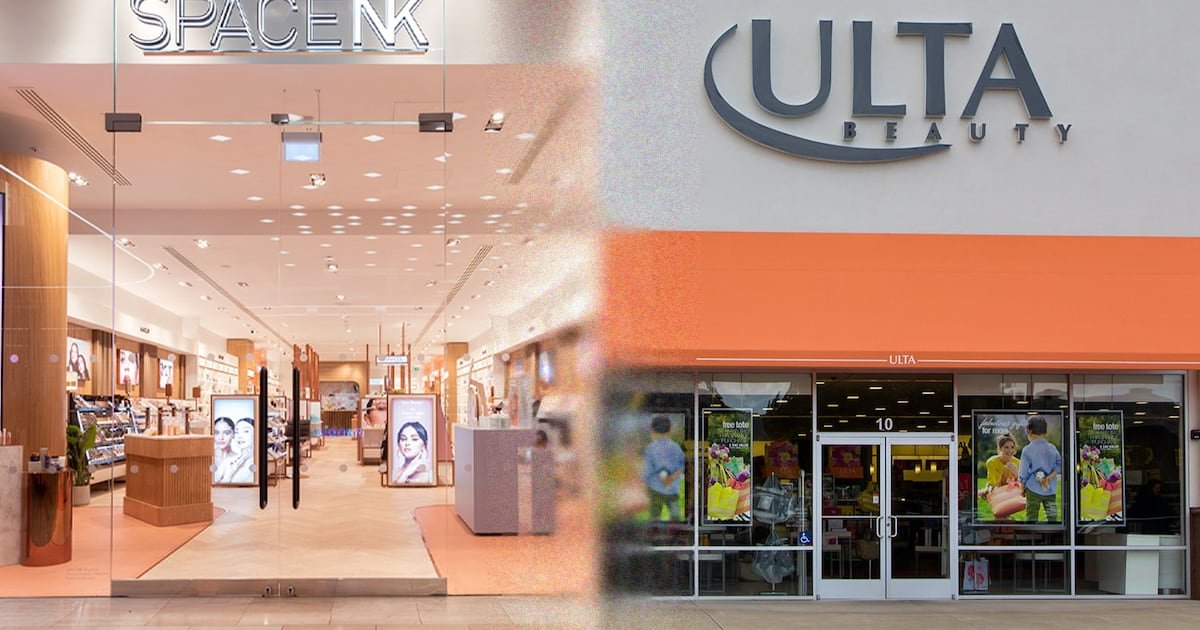The global beauty arms race is heating up.
On Thursday, Ulta Beauty announced it was acquiring the British retailer Space NK from its private equity owners Manzanita Capital. Financial terms of the deal were not disclosed. Rumours that Space NK was courting buyers had swirled for more than a year — the company had streamlined itself, selling off its US operations in 2024, whilst also investing in elaborate new stores. Within the new deal structure, Space NK will become a subsidiary of the US retailer and will operate stores independently.
Ulta Beauty’s choice to snap up Space NK demonstrates its commitment to expanding its global footprint. The retailer is preparing to launch its joint venture with Groupo Axo in Mexico in August and has reached a licensing agreement with Alshaya Group in the Middle East, with stores slated to open in Dubai and Kuwait by year-end.
Chief executive officer Kecia Steelman told The Business of Beauty that it chose Space NK on the strength of its brand and team, and that it realised needed to enter the region through an established banner. “We’re eager to learn from Space NK’s success in the UK and explore new ways to create meaningful growth for our brand partners as we expand our international presence,” said Steelman, describing the UK as a critical next step for the company.
The acquisition comes in the midst of an aggressive revamp which includes a recently refreshed C suite inclusive of Steelman, previously president and chief operating officer at the retailer; chief merchant Lauren Brindley, formerly of the UK’s Revolution Beauty; and chief marketing officer Kelly Mahoney and chief retail officer Amiee Bayer-Thomas.
Beyond reduced consumer spending and supply chain turmoil, previous market share gains have not panned out as expected for Ulta Beauty. In April, Steelman announced that the retailer had pressed pause on opening new shop-in-shops in Target. Once seen as a smart growth opportunity, the deal did not allow for the promised beauty discovery customers had hoped for, especially compared to what shoppers experienced when visiting Sephora in Kohl’s. Despite both retailers’ sheer size, customers were often confused about the difference between Ulta Beauty products in Target versus Target beauty.
For its fiscal year, Ulta Beauty is expecting 1 percent growth. Steelman’s recent moves are an attempt to kickstart growth and increase its competitive advantage against rivals Sephora and Amazon.
“What we’re seeing is a company that has dominated the domestic market, but has yet to do anything material abroad,” said Simeon Siegel, managing director at BMO Capital Markets, adding that buying a business was a quicker way to land in a new market than building from scratch. “[Ulta Beauty] is trying to figure that out,”
Why the UK?
Despite its small geographical footprint, the UK is a vital beauty market. According to research by the British Beauty Council and Oxford Economics, consumer beauty spending reached £32.4 billion (about $44 billion) in 2024, an 8 percent increase on the previous year. British customers shop and consume services voraciously; the same research showed that the industry’s contribution to overall gross domestic product increased 9 percent year-on-year, growing four times faster than the overall economy.
Ulta Beauty’s choice to buy an existing property rather than attempt its own storefronts is smart. When Sephora launched in the UK in 2023 after a 17-year hiatus and two previous failed attempts, it did so by buying local e-tailer Feelunique.
“International retailers see [the UK] as a really hard market to crack,” said Wizz Selvey, founder of Wizz & Co., a brand and retail strategy firm.
What will Space NK mean for Ulta Beauty?
To British locals, Space NK is arguably the UK’s most beloved premium beauty retailer.
It excels at high-touch, localised selling, and operates stores in major shopping districts like Battersea Power Station, and soon, London’s Oxford Street. Many of Space NK’s 83 stores offer beauty in smaller market towns and exclusive postcodes like the capital’s Muswell Hill, St John’s Wood or Sloane Square.
Space NK’s role as a curator of product and services was likely another selling point for Ulta Beauty. It has had a lock on beauty’s buzziest brands in the market from Rare Beauty to Sol de Janeiro. Space NK has also has become more price-agnostic, enabling a more diverse and nuanced customer to walk through its doors.
“We think of ourselves as hunters, so we go out and find brands, that’s really what we’re there to do,” chief executive Andy Lightfoot said at The Business of Beauty Global Forum in June, adding that a brand like Naturium, which in the US is thought of as a more mass label due to its Target distribution, had been a standout in Space NK’s assortment. “We think much more about the brands that consumers are looking for rather than trying to pigeonhole them and define what we should be in their shopping habits,” he continued.
Millie Kendall, chief executive of the British Beauty Council, pointed out that buying Space NK also gives Ulta Beauty immediate access to its stocked brands, distribution network and customer data. Smaller British brands might also get better footing to launch in the US through the deal, she said.
The 33-year-old Space NK is still growing fast. Last year, its turnover surged 34 percent, powered by growth in the under-25 cohort, the retailer’s fastest-growing demographic. Even with the arrival of Sephora, and growth of Boots, the local Walgreens-owned chain, Space NK has retained customers with its loyalty programme which offers generous cash discounts on spending. Through the deal, Space NK’s fleet of stores is also expected to grow.
But Space NK’s turnover, which reached $265 million in 2024, is a minnow compared to Ulta Beauty, whose revenue reached $3.5 billion last year. Siegel said the acquisition is not life-changing, referencing the minimal reaction in Ulta Beauty’s stock.
“The question is: What do they do with it?” he said.
What does this mean for beauty’s global turf wars?
The acquisition of Space NK gives the US company more firepower as it looks to supercharge growth.
Ulta Beauty plans to launch an Amazon-style marketplace this year and has exclusive brands like Beyoncé’s hair care line Cécred or makeup label Half Magic, but a cooling market still might get shoppers to stores. Indie brand building and newness is also not Ulta Beauty’s strong suit, but Space NK’s prestige portfolio fills in that gap. However, big brands are where Ulta Beauty’s bets are. Bayer-Thomas previously told The Business of Beauty prestige brands drive 70 percent of Ulta Beauty’s sales, and that it would prioritise the likes of established names like MAC Cosmetics and Clinique.
Looking to less-saturated markets such as Mexico and the Middle East allows for diversification, and while the UK is already penetrated with competitors, the Space NK name offers instant credibility.
Sephora has 2,700 stores in 35 countries, a count that is growing each day. The LVMH-owned retailer understands that global alliances are key in cracking beauty’s tougher markets. In November 2023, Sephora partnered with Reliance Retail, owner of Tira Beauty, to better understand India while also fending off its competitor, the domestic beauty giant Nykaa.
Right now, the acquisition will do little to affect Ulta Beauty’s bottom line, but it does give them the potential to unlock further growth.
“Presumably, the company views this as the beginning of their opportunity, not the end,” said Siegel.
Sign up to The Business of Beauty newsletter, your complimentary, must-read source for the day’s most important beauty and wellness news and analysis.









Good post! We will be linking to this particularly great post on our site. Keep up the great writing